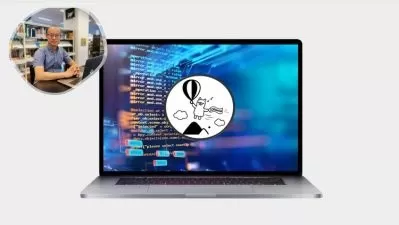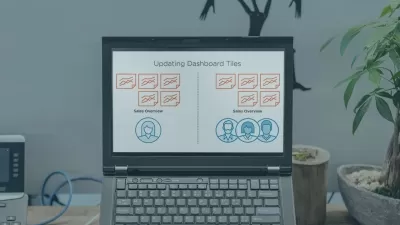ML in Production: From Data Scientist to ML Engineer
Andrew Wolf,Ilya Fursov
2:41:54
Description
Turn any ML model within Jupyter Notebook to production-ready microservice.
What You'll Learn?
- Transform ML models from Jupyter notebooks into production-ready microservices, focusing on deployment, dependency management, and maintainability.
- Learn to create robust APIs for ML models, covering API design, request handling, and ensuring scalability and security.
- Master Docker containerization for deploying ML models, including container management and best practices for ML applications.
- Gain hands-on experience with real-world deployment strategies, including CI/CD pipelines, version control, MLOps frameworks and maintaining live models.
Who is this for?
What You Need to Know?
More details
DescriptionThis comprehensive course is designed to equip you with the essential skills and knowledge required to transform Machine Learning (ML) models developed in Jupyter notebooks into fully operational, production-ready microservices. As a student of this course, you'll delve deep into the intricacies of taking an ML model from a mere concept in a notebook to a scalable and efficient application that thrives in a real-world production environment.
Throughout the course, you will learn to bridge the gap between data science and software engineering, elevating your ML capabilities from theoretical models to practical applications. The course starts with an introduction to the fundamentals of microservices architecture, setting the stage for understanding how ML models fit into larger software systems.
You will then learn how to effectively containerize your ML models using Docker, a critical skill in today’s software development landscape. This includes hands-on training on creating Docker images, managing containers, and understanding the principles of container orchestration.
API development is another cornerstone of this course. You will be guided through the process of designing and implementing robust APIs that allow your ML models to communicate seamlessly with other applications. This includes practical training on handling API requests and responses, along with ensuring the security and scalability of your APIs.
Moreover, the course covers deployment strategies, focusing on practical, real-world challenges. You will engage in setting up continuous integration and continuous delivery (CI/CD) pipelines, managing version control, and learning the best practices for monitoring and maintaining your models once they are deployed.
By the end of this course, you will have a well-rounded understanding of the full lifecycle of ML model development and deployment. You will be able to confidently take any ML model from a Jupyter notebook and turn it into a production-ready service, ready to deliver value in real-world applications. This course is an invaluable opportunity for anyone looking to enhance their career in data science, machine learning, or software engineering.
Who this course is for:
- Junior/Middle Data Scientists
This comprehensive course is designed to equip you with the essential skills and knowledge required to transform Machine Learning (ML) models developed in Jupyter notebooks into fully operational, production-ready microservices. As a student of this course, you'll delve deep into the intricacies of taking an ML model from a mere concept in a notebook to a scalable and efficient application that thrives in a real-world production environment.
Throughout the course, you will learn to bridge the gap between data science and software engineering, elevating your ML capabilities from theoretical models to practical applications. The course starts with an introduction to the fundamentals of microservices architecture, setting the stage for understanding how ML models fit into larger software systems.
You will then learn how to effectively containerize your ML models using Docker, a critical skill in today’s software development landscape. This includes hands-on training on creating Docker images, managing containers, and understanding the principles of container orchestration.
API development is another cornerstone of this course. You will be guided through the process of designing and implementing robust APIs that allow your ML models to communicate seamlessly with other applications. This includes practical training on handling API requests and responses, along with ensuring the security and scalability of your APIs.
Moreover, the course covers deployment strategies, focusing on practical, real-world challenges. You will engage in setting up continuous integration and continuous delivery (CI/CD) pipelines, managing version control, and learning the best practices for monitoring and maintaining your models once they are deployed.
By the end of this course, you will have a well-rounded understanding of the full lifecycle of ML model development and deployment. You will be able to confidently take any ML model from a Jupyter notebook and turn it into a production-ready service, ready to deliver value in real-world applications. This course is an invaluable opportunity for anyone looking to enhance their career in data science, machine learning, or software engineering.
Who this course is for:
- Junior/Middle Data Scientists
User Reviews
Rating
Andrew Wolf
Instructor's CoursesIlya Fursov
Instructor's Courses
Udemy
View courses Udemy- language english
- Training sessions 9
- duration 2:41:54
- Release Date 2024/03/19


















